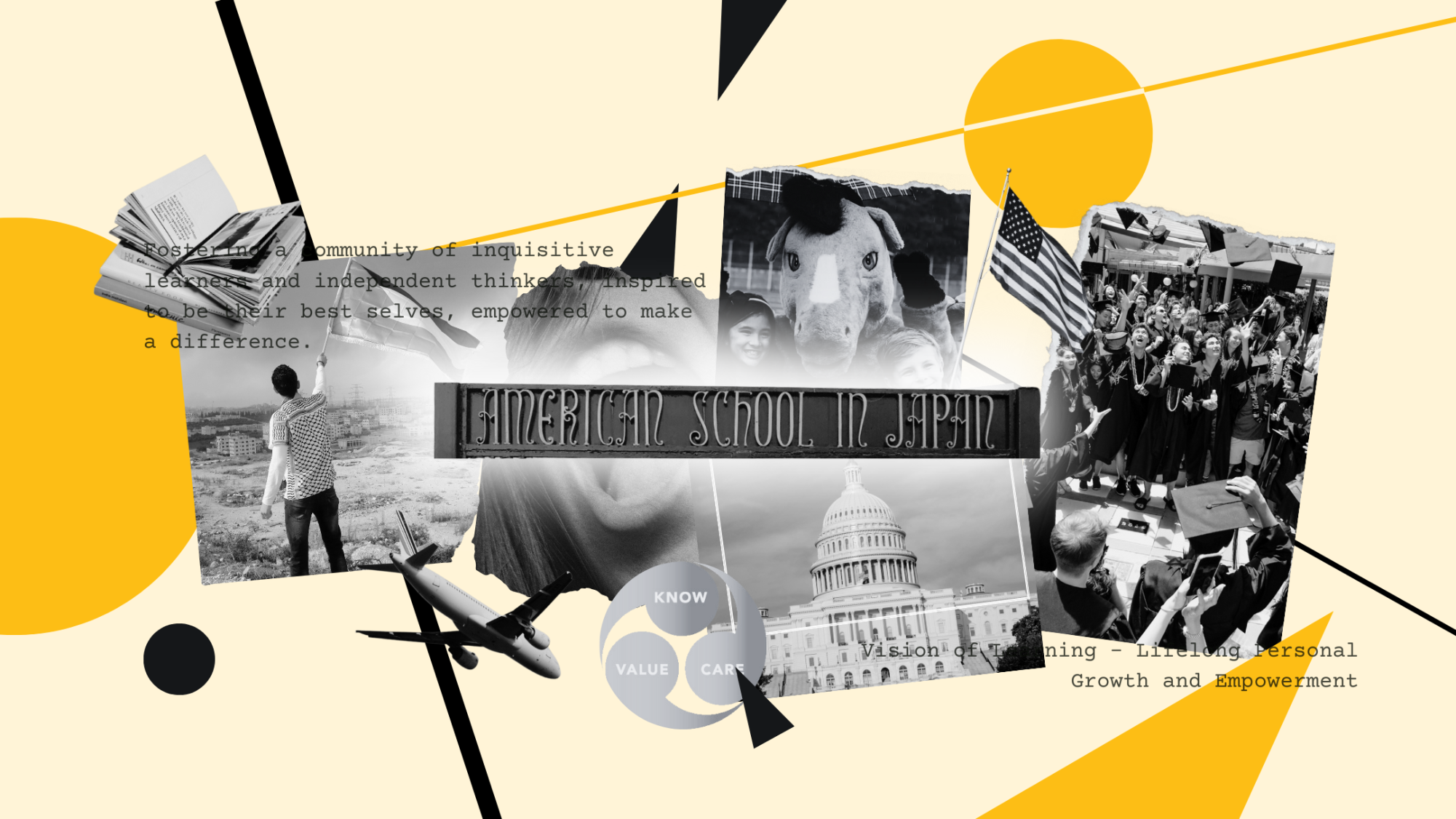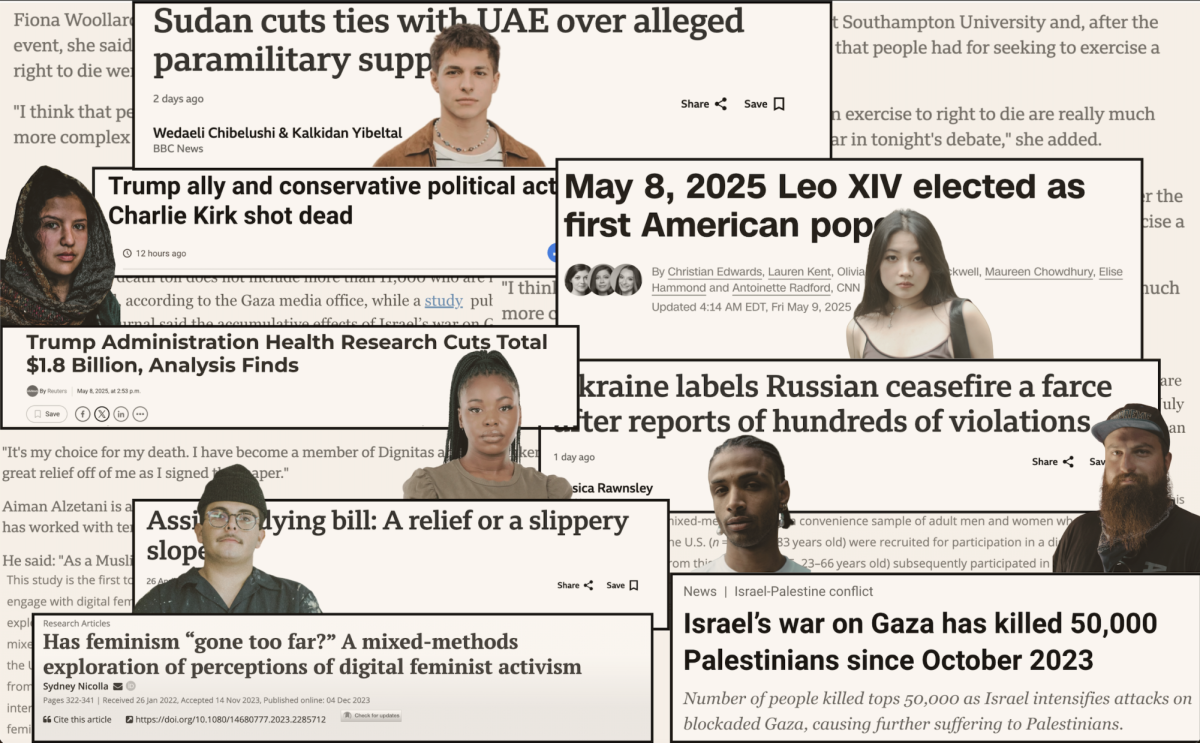ASIJ saved me. After attending a series of private and religious schools in South Korea, where learning was merely a relentless, rote pursuit of status within a rigid, standardized system, I arrived at ASIJ eight years ago with little intellectual curiosity and rife indifference.
Stepping onto the Chofu campus felt like entering paradise. ASIJ’s commitment to excellence, I quickly realized, extends far beyond academics, encompassing its sports facilities, support systems, extensive alumni network, and much more. Even now, I continue to be amazed by the community of impassioned teachers on campus and the many opportunities that lie within close reach.
Above all, ASIJ’s mission and purpose of helping “all students thrive and become accountable leaders and positive difference-makers in an increasingly complex, diverse, and rapidly changing world” is one that deeply resonated with me then and continues to do so today. As I embarked on my college search this past summer, I sought out institutions that closely embodied ASIJ’s ethos. This is because the school’s mission, in my opinion, is one that institutions worldwide should share and encapsulates the true essence of education: a pursuit of knowledge not for oneself, but for the betterment of society.
My utmost respect for this mission makes it all the more agonizing to witness its erosion.
Our mission, while clear and well-defined, is not one that aligns with the reality of our classroom experiences and our current institutional priorities. This misalignment is evident in our treatment of the war in Gaza, our “sustainable” practices, and our stated prioritization of student voice. Somewhere amidst the flashy ASIJ-branded Instagram videos and ubiquitous Portrait of a Learner posters, the fundamental purpose of an ASIJ education has been lost due to a lack of political and moral will.
The most conspicuous and disturbing example of this distance between our mission and our realities is ASIJ’s reluctance to address critical but uncomfortable world issues as an institution, namely, but not exclusively, the ongoing war in Gaza. Instead of making the decision to approach weighty topics with moral courage and unwavering certitude, we skirt, swerve, and sidestep around select controversial issues, breeding complacency and indifference among our students.
However, this hasn’t always been the case.
To wit, several months following the wrongful death of George Floyd in 2020, ASIJ issued a statement advocating for an “anti-racist stance” that promotes “respect, equality, and human dignity for all,” along with detailing some of the 25 initial actions — including student panels, town halls, and advisory lessons — implemented at the school since May of 2020.
Student panels then turned into statements. Russia’s invasion of Ukraine in February of 2022 prompted a short paragraph in the Mustang Bulletin that detailed the school’s guidelines on responding to “crises of a certain magnitude” and framed the war as a “real-life opportunity” to practice the Portrait of a Learner competencies.
Statements then turned into silence. No official communication has been disseminated to the broader student body regarding the war in Gaza, which started in October of 2023. Instead, in an email to faculty and staff, the administration copied and pasted the exact same text used in its response to Ukraine as a reminder for teachers to respond “compassionately and responsibly.”
And herein lies the paradox: while our world gets increasingly noisy, our classrooms grow all the more silent. From action to acknowledgment to outright silence, a consistent commitment to helping students navigate a “complex, diverse, and rapidly changing world” is hard to discern.
Clearly, the aforementioned events vary vastly. Yet, it is unconscionable that we claim to uphold values such as global citizenship and critical thinking while we neglect our responsibility as an institution to educate about or even acknowledge such crises. Instead, we choose to ardently champion the most apolitical, clear-cut causes, whether that be anti-racism or sustainability, while spinelessly shielding ourselves from any issue that carries even a hint of controversy.
Silence in confronting moral wrongs is in itself a moral wrong — a moral wrong that we are all complicit in.
ASIJ’s rationale behind approaching political discussions with heightened caution is the concern that such conversations could discomfit students impacted by these crises — a sentiment understandable, but unfeasible in the long term. As global crises mount and polarization grows, our mission and Portrait of a Learner competencies of empowering open communicators and critical thinkers become increasingly imperative for preparing students to navigate complex socio-political landscapes.
In fact, such shielding from difficult truths stems from a fundamental misunderstanding not only of our stated values, but the classroom’s purpose at large: an intellectual space to cultivate a thirst for knowledge and a penchant for discovery, even when confronted with ideas that challenge deeply held beliefs. As American author Flannery O’Connor wrote in 1955, the truth, while often “hideous, emotionally disturbing, and downright repulsive,” does not change “according to our ability to stomach it emotionally.” In a world where there are so many truths that are indeed “repulsive,” ignoring their existence does not alter our reality, and our emotional capacity to tolerate such truths diminishes as a result.
Barriers to open discourse are barriers to the pursuit of truth. Together, these obstacles cloud our identity as an educational institution.
Gaza is not a standalone event. Instead, our response to Gaza is symptomatic of a broader inconsistency we face as a school as we oscillate between being ardent champions for one cause and being completely indifferent to another, ultimately widening the gap between our stated priorities and everyday practices.
For one, ASIJ ardently champions the idea of being a sustainable, green school while seemingly allocating more financial resources towards promoting this ideal than embodying it. Even with the codification of sustainable practices within our board policies, we enthusiastically fly students around the world to participate in sports tournaments and allow teachers to ship an abundance of materials through Amazon on a near-daily basis.
Yet, this empire of contradictions is carefully scaffolded and self-justified through initiatives such as the establishment of a Sustainability Committee last year, alongside videos that primarily serve to market student-driven projects such as the ES Rice Project and the harvesting of lettuce from the school gardens. The extent of our altruism and awareness is ironically symbolized by graphics of the UN’s Sustainable Development Goals plastered on non-biodegradable styrofoam and on classroom walls, without recognition that many of our entrenched school systems are antithetical to those values.
Granted, debates over academic freedom and discussions around sustainability have persisted for decades across institutions worldwide. However, at ASIJ, the cornerstone of our educational philosophy lies in fostering student autonomy and amplifying student voice — a principle that distinguishes us as “Tokyo’s leading international school.” A phrase ubiquitous in many constitutive documents, our Strategic Design Framework specifically underscores the paramount importance of prioritizing “student voice” with nearly equal, if not more, weight than those of administrators, faculty, and parents.
Yet, a glaring disparity persists between rhetoric and action in this example too. Two weeks ago, ASIJ completed its search for a new Head of School for the 2025-26 school year, a process in which administrators seemed to arbitrarily select seven student leaders to interview the candidates with a series of predetermined, recommended questions. Not only does this highlight a failure to ensure the panel represents the diversity of the student body, but it also reflects a lack of confidence in ASIJ’s own education to nurture students capable of posing insightful questions independently.
Equally disconcerting is the abject lack of transparency in the decision-making process. Student interviewers were left in the dark regarding how their perspectives would contribute to the board’s decision, while the wider student body remained completely unaware that such proceedings had occurred. In a decision with far-reaching, years-long implications for our educational ecosystem, the selection of few voices without consulting the broader student body — arguably the most important constituency at any school — is nothing short of a dereliction of duty. This begs the question: if pivotal processes such as the Head of School search fail to prioritize student voice, what other vital decisions are being made without due consideration for our voices?
This instance is not an outlier. In a yet-to-be-published survey conducted by Hanabi among the class of 2024 —many of whom have been at ASIJ for all four years of high school — a staggering 61 percent of respondents expressed feeling undervalued and unheard by the administration.
From our treatment of Gaza to the dissonance between sustainable attitudes and actions to shortcomings in prioritizing student voice, there is a salient, growing gap between our mission, our classroom experiences, and our current institutional priorities.
To this end, ASIJ’s purpose should harken back to nurturing scholarly pursuit among young individuals, encouraging curiosity and pressing them to look for more in a world abundant with misinformation and disinformation; to seek dissenting opinions, and to challenge entrenched beliefs. When global crises of an unprecedented nature do happen, I want to see an ASIJ that harnesses the diversity of our community to facilitate safe — not sheltered — environments for political discourse and to have the backbone to, at the very least, acknowledge such crises on an institutional level.
Instead of letting ourselves fall victim to the many hotbed issues that U.S. campuses currently grapple with — including the fight over academic freedom and discomfort around conversations on politics — we can take this opportunity to serve as an example for educational institutions across the world and embody the “accountable” and “empowered” leaders we purport to cultivate in our mission statement, whether that be with regard to Gaza, sustainability, or student voice. Otherwise, we risk perpetuating an environment of self-censorship and fear, undermining the bedrock of a modern education: free and meaningful discourse.
Yes, there will inevitably be mistakes made. There will be ignorant political blunders. There will be discomfort and awkwardness. But being in an academic setting entails acknowledging the value of engaging in uncomfortable dialogue and learning from the mistakes that arise from it. As Danish philosopher Søren Kierkegaard emphasized in his 1844 book The Concept of Anxiety, we must “learn to be anxious” so that we do not “perish by never having been in anxiety or by succumbing in anxiety.” Discomfort is necessary for our existence not only as scholars but as humans, too.
All of this brings us back to our mission.
Our mission stares imploringly at us every day. There are very few classrooms at ASIJ where I cannot see the six Portrait of a Learner competencies and the Strategic Design Framework colonize the walls, silently asserting their presence. Our Definition of Learning is the first and last thing we see every day as we walk in and out of the Main Entrance.
Beyond mere physical spaces, our mission is so deeply embedded in our institutional ethos that it is meticulously woven into our long-term systems — whether that be our new campus design or faculty recruitment. Our institutional frameworks transcend temporal and spatial boundaries, shaping not only what our school looks like now, but what it will look like decades into the future.
ASIJ’s mission peers at us from every corner of our present and future. Let us finally confront its gaze.








solomon k • May 23, 2024 at 12:15 AM
The performativity/apathy of our institutions is disheartening. I felt this same frustration as an HS student. Don’t give up! There will always be a gap between institutional mission and practice. Students like you will be the reason that gap will eventually close.
Lily Nguyen-Moreira • Apr 26, 2024 at 9:07 AM
This is an excellent article, Sena that speaks not just to the mind, but touches the heart. Through your article, you have exemplified that topics such as these can be expressed with respect and candor.
Julia Neely • Apr 25, 2024 at 11:58 PM
Sena, thank you for using a platform you have available and being brave enough to start this conversation. As an alumn, your frustration with the performativity of the institution resonated with me deeply. All over the world, students are being silenced for showing their solidarity with the people of Palestine in this heartbreaking genocide. It is not new for educational institutions to champion free speech and social justice theory in their curriculum, yet remain silent and oppressive during crucial moments requiring recognition and solidarity. Fortunately, universities and educational institutions often lag in effecting change, with students being the driving force behind transformative initiatives. Keep holding institutions accountable! We have your back 🙂
Kentaro Mathis • Apr 25, 2024 at 6:52 AM
Thank you for the excellent article. It is sober and frank. ASIJ’s aversion to discomfort is not new, but often only becomes clearer after one steps away. To be able to gaze critically from within both shows your awareness and is proof of your desire to contest its norms. As you have noted, this is an inherently uncomfortable task. But it is also something to be protected and cherished. How the school—administrators, faculty, students, and parents in total—chooses to react to your article will be indicative of the culture it truly seeks to perpetuate.
Karen Noll • Apr 24, 2024 at 10:17 PM
Admiring the brilliance of this opinion piece from afar in Minnesota. Thank you, Sena, for posing the challenge of authentic messaging. Your messaging says don’t stomach it, any of it.
Cory Willey • Apr 24, 2024 at 10:05 PM
Thank you for challenging us, Sena. We needed to hear this!
Alain • Apr 24, 2024 at 7:02 PM
Thank you Sena. This was a much needed article.
Arnab • Apr 24, 2024 at 6:56 PM
Amazing article Sena! There’s a lot of truth in this article that needs to be addressed, and this article is definitely a step towards the right direction.
Aarya Bharadwaj • Apr 24, 2024 at 4:36 PM
Thank you Sena for the great article and read. Especially interesting was the explanation of the lack of trust that administration seems to have towards the student body and some of the facades of “great” progress that are around campus, though I do think that change is happening.
Deanna Elstrom • Apr 24, 2024 at 3:33 PM
Bravo, Sena! You are brave, articulate and point out that words without sincerity are meaningless.
Lila • Apr 24, 2024 at 3:07 PM
This is incredible Sena. Thank you.
dwain confer • Apr 24, 2024 at 2:31 PM
Thank you, Sena, for this powerful and respectful critique.
Sophie Smith • Apr 24, 2024 at 9:23 AM
Sena, thank you for your true display of what Character, Courage, and Compassion should actually mean and for being brave enough to publish what we were all really thinking. This is a MUST read.